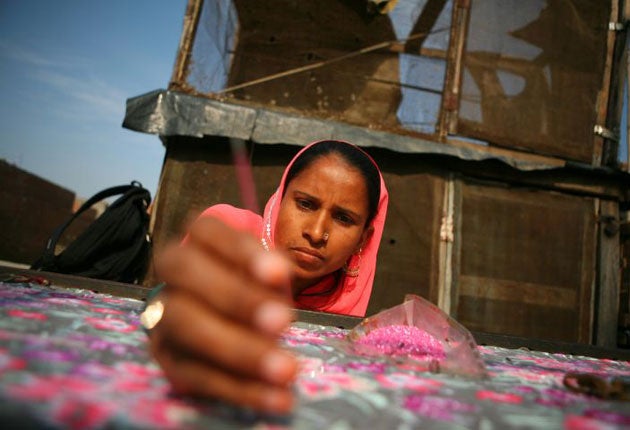Independent Appeal: Delhi women seek their fair share of the fashion profits
Andrew Buncombe reports on how One World Action helps workers toiling for 50p a day

Every day Farida Begum gets up at 5am. She cleans her tiny two-room house, prepares food for her husband and gets her four young children ready for school. Having done that, she will spend seven or eight hours carefully embroidering hand-bags and babies' clothes for high street fashion chains in the West. For a bag that might take two-and-a-half hours of concentration and nimble-fingeredness to complete she will earn 40 rupees (55p) and for a child's T-shirt just 10 rupees. By day she sits working on her rooftop, one eye on her children when they return from school. At night, she will continue her labours by the stuttering light of a candle.
So when Farida recently flew to Heathrow, took the train into the city and discovered in a Gap store on Islington High Street a baby's T-shirt selling for more than £13, she was – to say the least – somewhat staggered.
"The prices are so high," laughs the feisty 32-year-old, back home in a poor neighbourhood of east Delhi. "Every time I was calculating things in Indian rupees. I did not buy many things – just three our four toys."
Farida was flown to London as part of a campaign organised by the charity One World Action, for which funds are being raised by The Independent's Christmas appeal. She travelled to the UK to make a political point; namely that Western chains could and should do more to help raise the wages for workers in the developing world. What she had not anticipated, perhaps, was that both the staff and customers in the store she visited were fascinated to hear first-hand about the lives of Farida and her colleagues and the stories behind the clothes that so many of us buy, wear, and take for granted.
"A woman asked whether I made these clothes and I said 'yes'. She was very happy seeing a home-based worker from India," she adds. "But I was frustrated that we get such a low rate. I was comparing the cost with the rate I get in India ... The buyers get cheap labour."
For the countless thousands of Indian women like Farida, working from home for the most meagre income for suppliers who have contracts with Western stores, the fight for better wages is a constant and usually thankless task. By themselves, these usually uneducated workers have no voice; if they are not willing to toil for the rates offered by the contractor, he can always find someone else who is. India does not lack for labour.
And people's needs are desperate. Farida's husband earns just 3,000 rupees a month (£40) making spare parts for electricity generators. She says that some people might assume she is working for pocket-money but she is not. The survival of herself and her family depends upon it.
But gradually these women are getting organised. Working with NGOs, they find that by coming together they have more chance of negotiating for better rates. They are not always successful – sometimes a contractor will opt to go somewhere cheaper – but together at least they can be heard. They are also in discussion with stores such as Gap about discovering ways to ensure Western fashion companies source their clothes from suppliers who pay better wages.
"We are negotiating with the suppliers and we ask them to raise the price per item," says Garima Gupta, a programme manager with the Self-Employed Women's Association (Sewa). "Sometimes we say that we will not do the work at that price."
In the north-east of Delhi, Sewa – which is supported by One World Action – operates as a co-operative for the hundreds of neighbourhood women who work from home. Some, such as Farida, are skilled embroiderers, but others are largely untutored and often inexperienced. For these women the rates of pay can be pitiful.
For sewing a simple decoration on to the front of a child's dress, a worker can earn as little as three-and-a-half rupees (5p). An experienced seamstress might complete the task in 30 minutes but someone else might take an hour. As a result, many of the women here toil for 50p a day or less.
"We can do 10 a day. The suppliers need to increase the amount we get paid," says Ira Devi, a 37-year-old woman with three children. "I like the designs of the dresses but I could never afford them for my children."
Another woman, Neelam, who has two children, also grumbled that she could manage just 10 of the dresses a day. "Some people can manage up to 20 or 25," she sighs.
Farida reflects on the time she spent in Britain. She found it strange, she says – the stringy cheese on a pizza she was given to eat, the way everyone rushed breathlessly about their business. She was nervous too, about flying, about leaving her children at home. Yet she believes the journey will have been worth it if people think twice the next time they go shopping. She says: "I feel that the contractors and suppliers are making such a huge amount of money." The work of organisations like One World Action can help women like Farida negotiate for a bigger slice of that profit.
Join our commenting forum
Join thought-provoking conversations, follow other Independent readers and see their replies
Comments